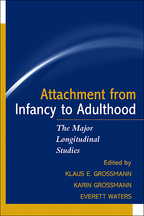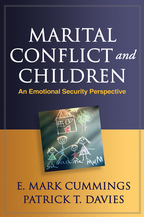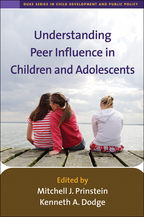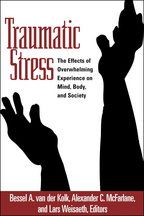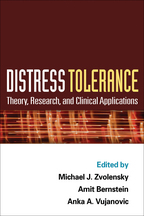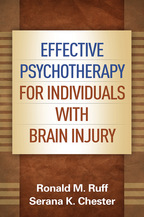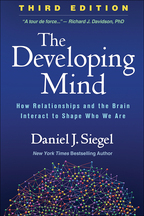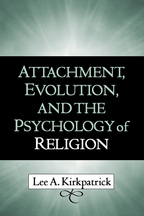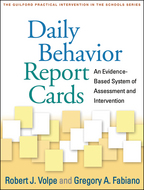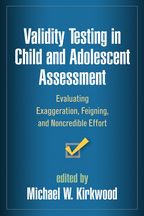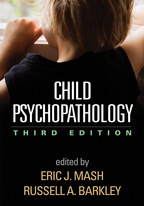Attachment from Infancy to Adulthood
The Major Longitudinal Studies
Edited by Klaus E. Grossmann, Karin Grossmann, and Everett Waters
HardcoverPaperback
Hardcover
orderMarch 21, 2005
ISBN 9781593851453
Price: $75.00 332 Pages
Size: 6" x 9"
Paperback
orderJune 23, 2006
ISBN 9781593853815
Price: $50.00 332 Pages
Size: 6" x 9"
“Careful reading of all the chapters will provide the student of attachment theory an abundance of helpful information. Armed with this information, educators can highlight those propositions of the theory for which there is empirical support and researchers can identify areas for future research. Practitioners from a variety of practice settings can benefit from the text by understanding the complex interplay between attachment and mental health.”

—Child and Adolescent Social Work Journal
“This volume will be welcome and informative for students of attachment theory and behavior.”

—Bulletin of the Menninger Clinic
“This collection of international studies provides a comprehensive overview of the pioneers in attachment theory following the Bowlby-Ainsworth tradition. This book offers a unique window into the personal and professional lives of these noted scholars, who have dedicated their life's work to the study of attachment relationships. Their deep conviction in the importance of attachment theory and dedication to the science of this tradition serve as an inspirational model for the researcher clinician. This book is recommended for therapists, researchers, and teachers in the field.”

—The Journal of Nervous and Mental Disease
“'The child is father to the man': Wordsworth intuited it; Freud asserted it; Bowlby systematized it; this book proves it. Grossmann, Grossmann, and Waters have assembled an illustrious gallery of top attachment and developmental researchers. They present their findings in ways that are scientifically convincing as well as highly readable and personally moving. Reductionists, eat your hearts out—or, rather, start to search for the mechanisms that underlie these incontrovertible links between childhood attachment experience and adult relational competence. This volume is a 'must' for all psychotherapeutic clinicians and child development researchers, and will become a standard text for courses in clinical psychology and social work. I will certainly use it as such in the master's program in psychological therapies that I run.”

—Jeremy Holmes, MD, FRCPsych, University of Exeter and University College London, UK
“This book provides a unique overview of more than 30 years of fascinating longitudinal research on attachment development. It contains marvelous reports of the seminal longitudinal studies conducted by the most well-known people in the field. The volume demonstrates in an impressive manner how empirical findings not only can confirm assumptions derived from theory, but also can challenge those assumptions and thus contribute to the ongoing development of the theory. As such, it is highly interesting reading for experienced researchers as well as students.”

—Gottfried Spangler, PhD, Department of Psychology, University of Erlangen-Nuremberg, Germany
“Attachment theory really comes of age in this volume....Contributions written by pioneers and current giants in the field impressively connect attachment theory and research to cross-cultural variations, the social context, and human evolution. This book is required reading for anyone interested in the contemporary and long-term consequences of early close relationships.”

—Arnold J. Sameroff, PhD, Center for Human Growth and Development, University of Michigan
“This book presents an intriguing view of the evolution of an entire scientific field. Interwoven with important data and theoretical discussions, we find historical and personal notes from the people who have been instrumental in making child-parent attachment a central area within developmental psychology. The fascinating, up-to-date accounts in this volume will be useful and inspiring for readers in scientific and applied settings.”

—Gunilla Bohlin, PhD, and Berit Hagekull, PhD, Department of Psychology, Uppsala University, Sweden
—Child and Adolescent Social Work Journal
“This volume will be welcome and informative for students of attachment theory and behavior.”
—Bulletin of the Menninger Clinic
“This collection of international studies provides a comprehensive overview of the pioneers in attachment theory following the Bowlby-Ainsworth tradition. This book offers a unique window into the personal and professional lives of these noted scholars, who have dedicated their life's work to the study of attachment relationships. Their deep conviction in the importance of attachment theory and dedication to the science of this tradition serve as an inspirational model for the researcher clinician. This book is recommended for therapists, researchers, and teachers in the field.”
—The Journal of Nervous and Mental Disease
“'The child is father to the man': Wordsworth intuited it; Freud asserted it; Bowlby systematized it; this book proves it. Grossmann, Grossmann, and Waters have assembled an illustrious gallery of top attachment and developmental researchers. They present their findings in ways that are scientifically convincing as well as highly readable and personally moving. Reductionists, eat your hearts out—or, rather, start to search for the mechanisms that underlie these incontrovertible links between childhood attachment experience and adult relational competence. This volume is a 'must' for all psychotherapeutic clinicians and child development researchers, and will become a standard text for courses in clinical psychology and social work. I will certainly use it as such in the master's program in psychological therapies that I run.”
—Jeremy Holmes, MD, FRCPsych, University of Exeter and University College London, UK
“This book provides a unique overview of more than 30 years of fascinating longitudinal research on attachment development. It contains marvelous reports of the seminal longitudinal studies conducted by the most well-known people in the field. The volume demonstrates in an impressive manner how empirical findings not only can confirm assumptions derived from theory, but also can challenge those assumptions and thus contribute to the ongoing development of the theory. As such, it is highly interesting reading for experienced researchers as well as students.”
—Gottfried Spangler, PhD, Department of Psychology, University of Erlangen-Nuremberg, Germany
“Attachment theory really comes of age in this volume....Contributions written by pioneers and current giants in the field impressively connect attachment theory and research to cross-cultural variations, the social context, and human evolution. This book is required reading for anyone interested in the contemporary and long-term consequences of early close relationships.”
—Arnold J. Sameroff, PhD, Center for Human Growth and Development, University of Michigan
“This book presents an intriguing view of the evolution of an entire scientific field. Interwoven with important data and theoretical discussions, we find historical and personal notes from the people who have been instrumental in making child-parent attachment a central area within developmental psychology. The fascinating, up-to-date accounts in this volume will be useful and inspiring for readers in scientific and applied settings.”
—Gunilla Bohlin, PhD, and Berit Hagekull, PhD, Department of Psychology, Uppsala University, Sweden

